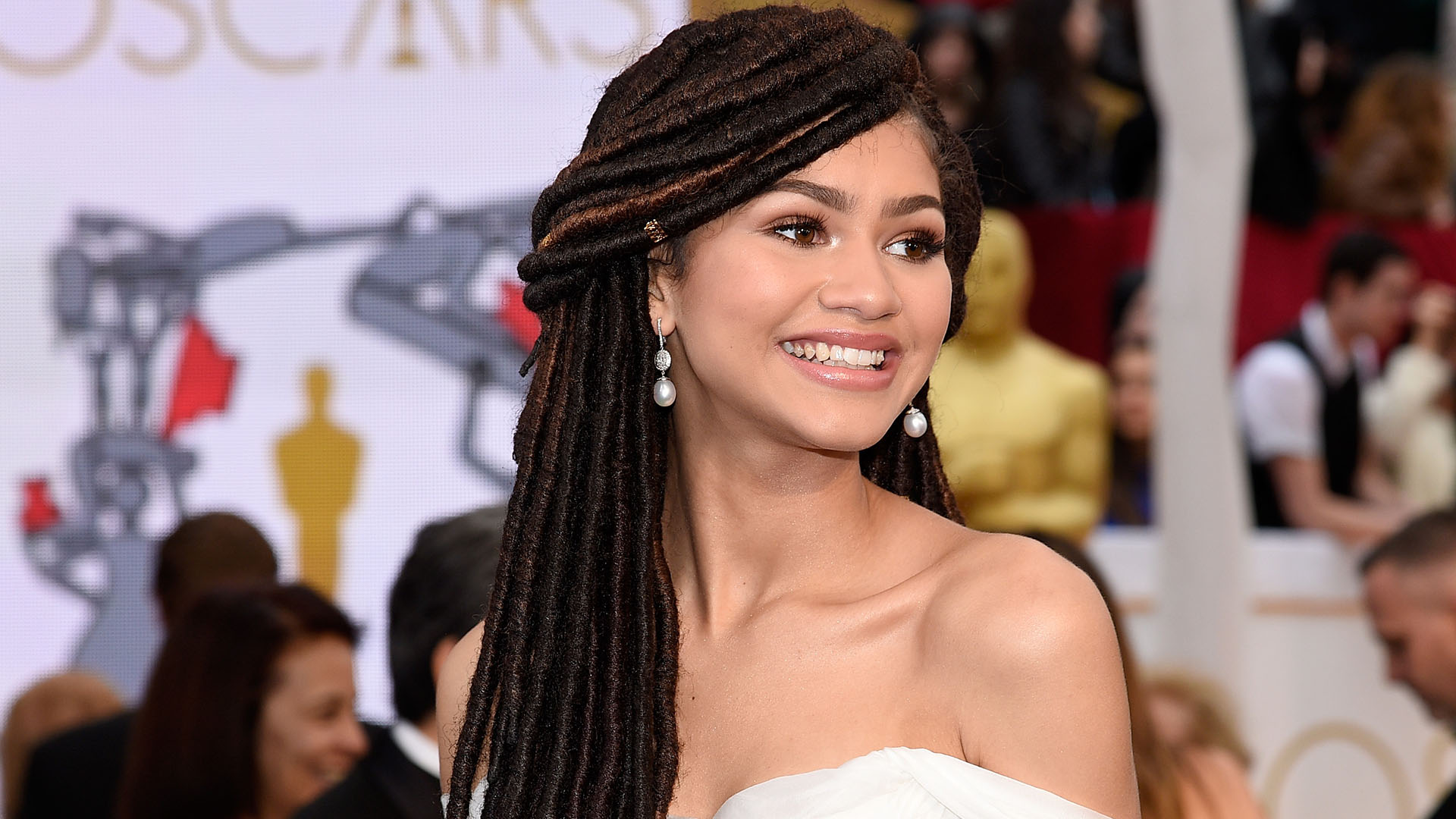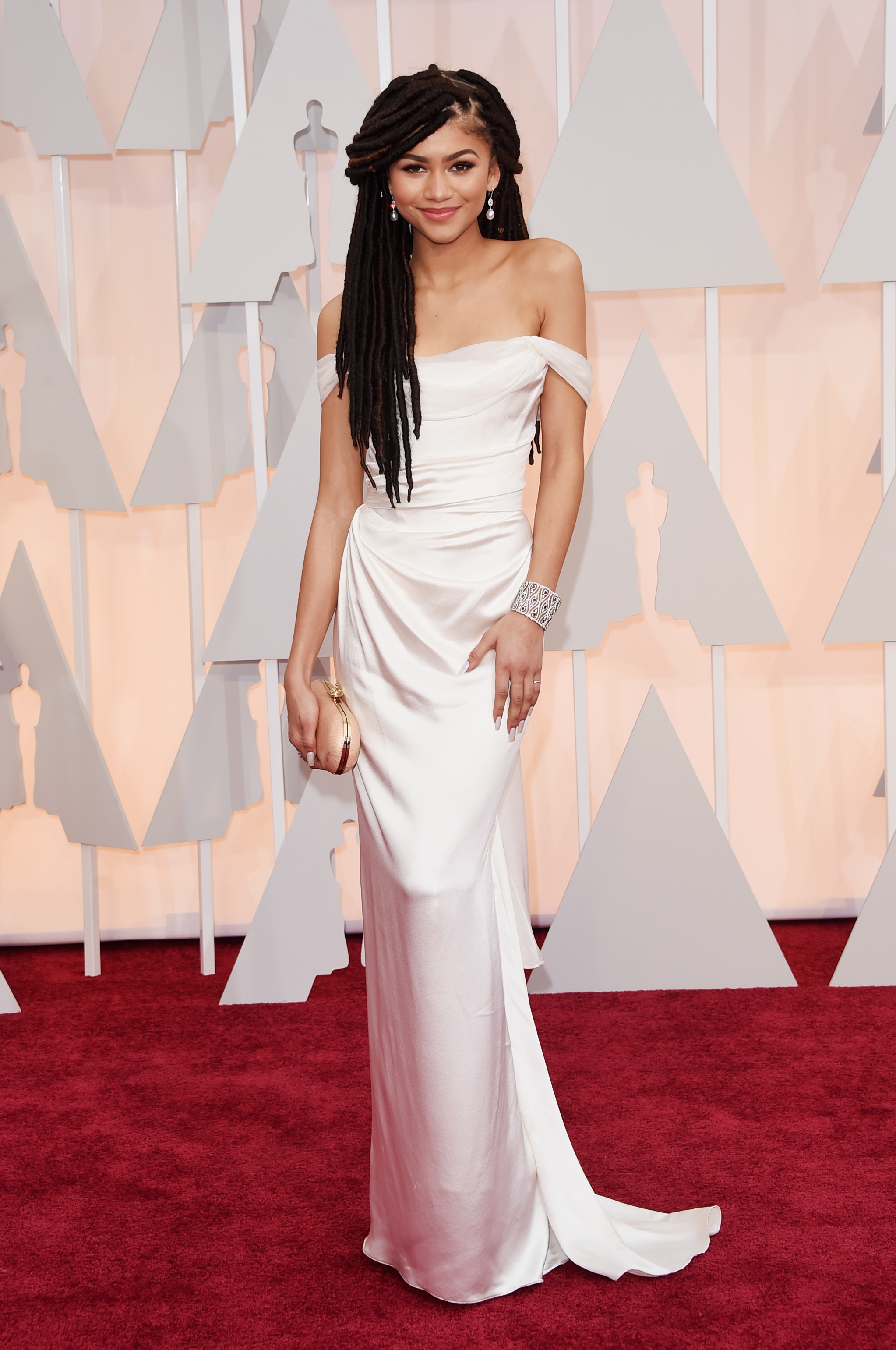How Zendaya’s 2015 Oscars Look Paved the Way for The CROWN Act
"That one instance went on to actually change the way Black people’s hair was accepted in schools and the workplace."

The best fashion statements say something about the world off the red carpet—and if you're looking for an example, look no further than Zendaya's show-stopping look from the 2015 Academy Awards.
The actress' longtime stylist, Law Roach, reflected on the impact of that iconic look during a November 23 conversation at the Teen Vogue Summit in Los Angeles.
While the off-the-shoulder, ivory Vivienne Westwood gown Zendaya wore for the 2015 Oscars red carpet was objectively stunning, it was the then-18-year-old's hair, styled in dreadlocks for the event, that made the most headlines after Giuliana Rancic commented on E!'s Fashion Police that the young actress looked like “she smells like patchouli oil or weed."

Zendaya in an ivory, off-the-shoulder Vivian Westwood gown at the 2015 Academy Awards.
Rancic's comments immediately drew criticism and Zendaya addressed the problematic take personally in a post on Instagram.
“There is a fine line between what is funny and disrespectful. Someone said something about my hair at the Oscars that left me in awe. Not because I was relishing in rave outfit reviews, but because I was hit with ignorant slurs and pure disrespect," she wrote at the time. "To say that an 18-year-old young woman with locs must smell of patchouli oil or 'weed' is not only a large stereotype but outrageously offensive. I don't usually feel the need to respond to negative things but certain remarks cannot go unchecked."
A post shared by Zendaya (@zendaya)
A photo posted by on
In addition to prompting a swift and public apology from Rancic, the backlash and Zendaya's response jump-started a larger conversation about discrimination against race-based hairstyles and helped pave the way for The CROWN Act just a few years later, according to Roach.
“Fashion has the ability to make political statements, and I think that we should use fashion to express ourselves and what we agree with and what we disagree with, what’s going on in politics, because it’s our voices that should make a difference,” the stylist explained. “That one instance went on to actually change the way Black people’s hair was accepted in schools and the workplace. So although we did not set out to make this big statement, because of the events that happened, The CROWN Act was actually birthed from that incident.”
Get exclusive access to fashion and beauty trends, hot-off-the-press celebrity news, and more.
The CROWN Act—which stands for Creating a Respectful and Open World for Natural Hair—"was created in 2019 by Dove and the CROWN Coalition, in partnership with then State Senator Holly J. Mitchell of California, to ensure protection against discrimination based on race-based hairstyles by extending statutory protection to hair texture and protective styles such as braids, locs, twists, and knots in the workplace and public schools," according to the act's official website.
Although Zendaya's decision to wear her hair in locs for the 2015 Oscars ultimately had a huge impact on a societal level, Roach says that wasn't their intention when they crafted her look for the event.
“It was something that we were just doing and didn’t know that it would happen that way," explained during his recent conversation at the Teen Vogue Summit. "But we are grateful that it did because it really created a global conversation of what’s appropriate for Black people’s hair, especially Black women.”
Kayleigh Roberts is a freelance writer and editor with over 10 years of professional experience covering entertainment of all genres, from new movie and TV releases to nostalgia, and celebrity news. Her byline has appeared in Marie Claire, Cosmopolitan, ELLE, Harper’s Bazaar, The Atlantic, Allure, Entertainment Weekly, MTV, Bustle, Refinery29, Girls’ Life Magazine, Just Jared, and Tiger Beat, among other publications. She's a graduate of the Medill School of Journalism at Northwestern University.